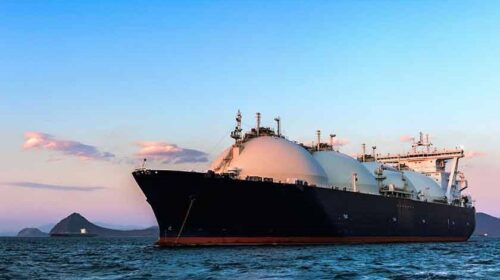Pakistan GasPort Consortium (PGPC), which operates a liquefied natural gas (LNG) terminal, has turned down the strict conditions laid down for utilising excess capacity of its terminal.
PGPC’s terminal has handling capacity of 750 million cubic feet per day (mmcfd) of LNG. State-owned Pakistan LNG Limited has been allocated 600 mmcfd of capacity at the terminal, which has operated at full capacity for only a few days.
The terminal operator is seeking to utilise its 150mmcfd idle capacity at its own risk. PGPC and PLL also signed an agreement on August 3, 2022 that gave unconditional rights to the former to utilise surplus capacity of the terminal.
However, the government has made it difficult for the terminal operator and is not permitting it to utilise its own capacity.
In a letter to the Petroleum Division, PGPC has turned down the laid-down terms and conditions, saying it had not been able to facilitate private investors in receiving a single LNG ship over the last four years despite idle capacity at the terminal.
On the other hand, PLL has failed to arrange LNG over the last one year, particularly ahead of the winter season.
PGPC is handling only two ships a month against the government’s allocation of six ships due to PLL’s failure to arrange LNG cargoes.
In the letter, PGPC said “in a country which desperately needs gas and which has been offered a viable solution by private sector to bring gas and sell it at its own risk and responsibility, to say the least, your (Petroleum Division) letter is disappointing”.
The company was referring to a letter written by the Petroleum Division on September 11, 2022, which imposed some conditions that seemed to be giving PLL the primary rights of utilising the full terminal capacity.
After four “frustrating” years, according to the terminal operator, PLL and PGPC signed an arrangement vide PLL’s letter of August 3, 2022, which, if it had been allowed to be implemented, would have seen at least one cargo at the PGPC terminal by now.
“Any deviation from the agreement is not workable for PGPC,” it said, adding that PGPC, therefore, regrets its inability to accept the terms proposed by the Petroleum Division in its letter.
PLL, in its letter sent to PGPC CEO on August 3, 2022, sought PGPC’s confirmation of the import of third-party cargoes.
Under the arrangement, out of the total physical capacity of 750 mmcfd of the Floating Storage and Re-gasification Unit (FSRU), PLL shall have unconditional access to the peak daily delivery capacity of 650 mmcfd for 300 days (which may be increased to 350 days) and 690 mmcfd for 45 days on the “operator’s reasonable endeavour” basis, subject to the unloading of a maximum of 4.5 million tons of LNG per annum by PLL at the terminal.
PLL further said it would have berthing priority for its cargoes, however, both parties would work together for managing the berthing slots and there would be no restrictions on utilising the storage by either party.
“If PLL suffers any demurrages or loss as a consequence of failure of the third party/ operator, then PGPC will bear the loss suffered by PLL and will indemnify PLL in any such instance.
“PLL, on the other hand, will not take any additional liabilities, nor incur any extra costs for facilitating the import of private sector LNG cargoes.”
PLL said “this clarification letter shall be valid for the remaining term” of the agreement and would be considered terminated if the London court upheld the termination notice issued by PLL.
Subject to this arrangement, PGPC, under Clause 9.4 of the agreement, shall have unconditional right to use the excess capacity available at the terminal for third-party (including PGPC’s affiliates) use, after meeting its obligations to PLL.
According to the letter sent by the Petroleum Division to PLL and PGPC, the division floated some proposals that violated the earlier arrangement between the two companies.
It said the arrangement between PLL and PGPC would become effective only after the operational capacity test of FSRU at the operator’s expense and confirmation that the daily delivery capacity of 650 mmcfd for 350 days could be made available to PLL on a firm basis.
“Out of the total physical capacity of 750 mmcfd of the FSRU, PLL shall have unconditional access to daily delivery capacity of 650 mmcfd on a firm basis for 350 days.”
It further said that the peak daily delivery capacity of 690 mmcfd would be available to PLL, as and when required, for a specific number of days (at least 45 days) on a firm basis instead of “on reasonable endeavour” basis.
“Third-party access (TPA) may be for up to one year only, extendable through mutual agreement.”
Since revenue through the TPA will be an additional benefit to PGPC without making any additional investment and PLL will have to compromise by sharing its storage capacity, berthing slot, etc, therefore, 50% of the monthly capacity charges, prorated for one cargo, (out of capacity payments of average six cargoes a month) will be netted off by PLL from the capacity payments of PGPC.







